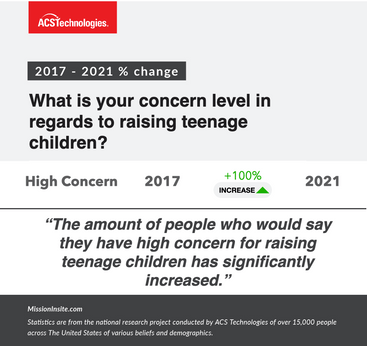Those who feel raising a teen was a high concern have doubled over the past four years. In today’s fluid moral landscape, many believe that good and bad are relative concepts and that beliefs can change according to culture, social context, or opinion, many teenagers and young adults struggle to subscribe to a concrete moral belief. Christianity can be seen as ridged and irrelevant, and many parents struggle to raise teens who connect with the church.

As a parent, many are eager to raise children with a strong relationship with Christ so they can experience His love, connection, and guidance for themselves. Teenagers are often stretched thin between school, stress, and the general pressures of growing up, and if they did not develop a desire to go to church as a child, find themselves wanting to spend time with other activities on Sundays. Below are several ways your church can welcome teens and can reassure their parents that their teen is being given the tools to grow in their relationship with Christ and develop a strong moral compass.
Ways to Attract Teens and Keep Them Interested in Attending Your Church while Growing Closer to God:
Ask them what they like or do not like about going to church on Sundays.
This may seem obvious, but a good place to start is just asking teenagers what interested them. Once you start the conversation, you may be surprised by how straightforward the teen’s requests and desires are. They may be looking for more fun events to attend or for ways to meet other teens in a small group. It’s best to not assume what teens want and to ask them directly. By opening the conversation and allowing them to voice their opinions, you’re letting them know they’re heard and that their desires are important.
Think outside the box when planning youth events.
Teens will be more inclined to go to and will be more engaged when attending events designed for them and their friends. Beginning in early adolescence, peers have a much greater influence than in earlier years. By designing concerts with glow sticks or large group beach trips specifically for teens, they are able to spend time with their peers at church without feeling bored or disengaged.
Equip pastors and parents to be able to answer the hard questions.
Children and teens will often follow their parent’s example. If the parents themselves do not attend church with enthusiasm or only attend every once in a while, how can their teens feel enthused to go on Sundays? By helping the parents themselves develop their relationship with Christ and helping them set a good example for their children, the church can help both generations grow in their faith.
Equally important is equipping parents with the correct answers regarding Christ and Christianity that may be asked by their teens. Older generations need to prepare to answers tough questions asked by younger Christians. Especially with today’s ever-changing societal norms, parents and church elders need to be an example for teens who may be struggling with their faith.
Conclusion
This is not to say that taking teens to church every Sunday and raising them will not be without its challenges. However, encouraging them to keep their close friends at church, to ask any questions they may have, and setting a good example will help a lot when helping them develop their morals and enriching their relationship with Christ.
DOWNLOAD 5 MUST-HAVES TO
ENGAGE MILLENNIALS FOR FREE!
Despite what you may have read, millennials still believe in God, hold to absolutes of right and wrong, and pray as much (or in some cases more) than people among their age group in the past. But at the same time…
Millennials are far less engaged with church affiliation than any generation in recent American history.
Discover the 5 must-haves to engage millennials by downloading your free guide today.
Andrew Esparza is the founder of Kingdom Analytics. This company has served over 300+ organizations doing good in the world by helping better connect them to their community, congregation, or customers using advanced demography research. He also has experience in the church world working for the largest high school ministry in the country at North Point Community Church. Andrew graduated from Arizona State University with degrees in Design Management and Tourism Development and is CITI certified in Social and Behavioral Research.





